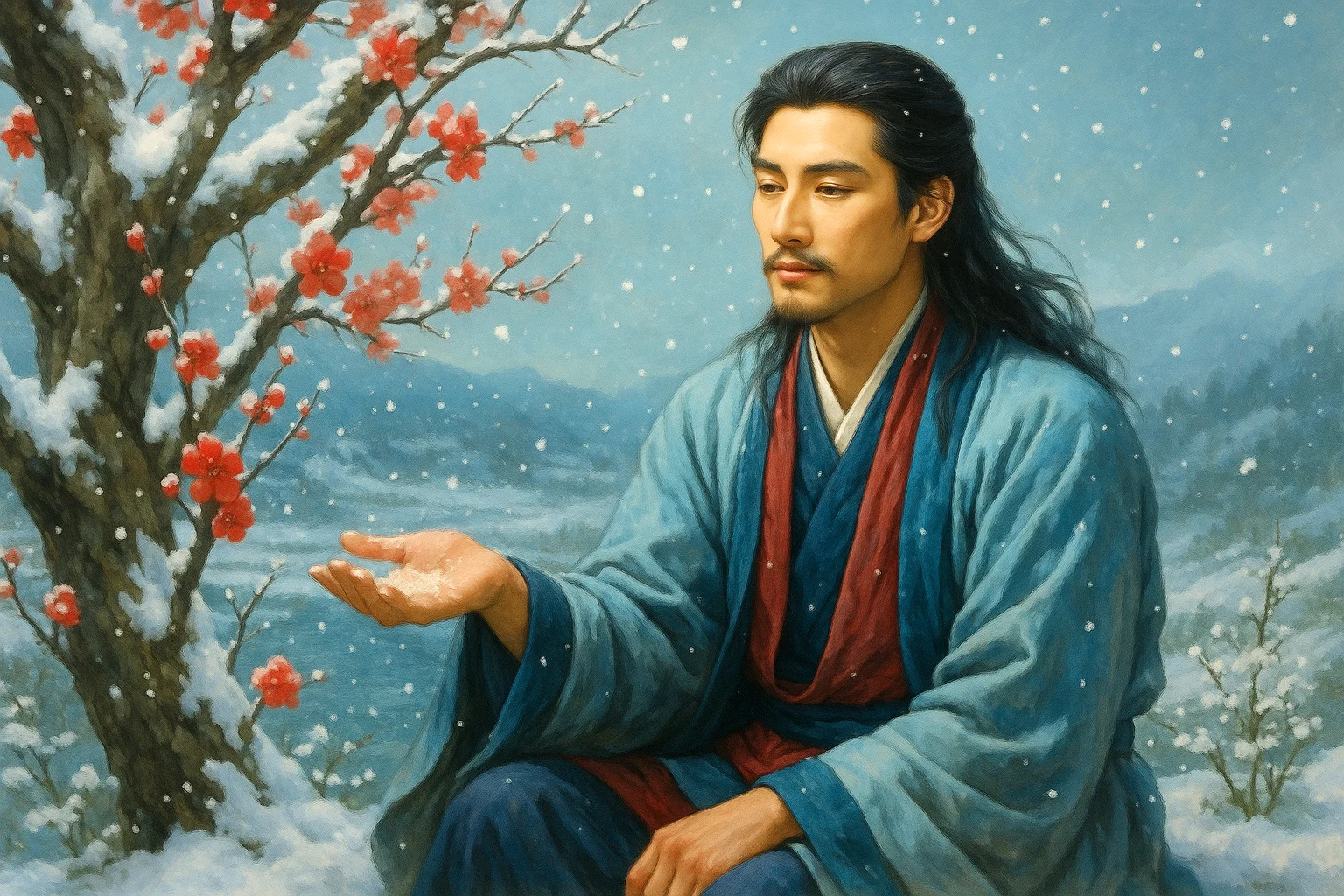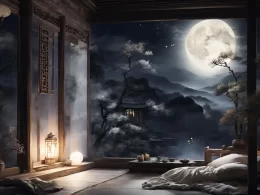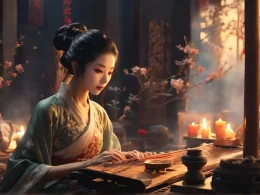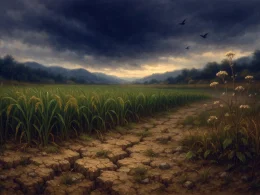A boat amidst blushing blooms—
I recall on arrival,
paired with mandarin ducks as companions.
Of thirty-six lotus ponds, untouched by men,
countless water-jeweled gowns sway in the breeze.
Jade-green leaves breathe coolness,
fair faces flushed from wine,
then a drizzle sprinkles the cattail reeds.
A coy sway, a graceful dance—
cold fragrance soars into my verse.
Dusk falls.
Like parasols of jade, they stand tall and serene.
But where is my love?
How could I bear to leave on rippling steps?
I fear their dancing skirts, chilled, may fall too soon,
as sorrow drifts on west winds over southern shores.
Tall willows cast shadows,
old fish stir the waves—
they beg me to linger among the flowers.
How many layered leaves remain?
How many times must I turn back on the sandy path?
Original Poem
「念奴娇 · 闹红一舸」
闹红一舸,记来时,尝与鸳鸯为侣,
三十六陂人未到,水佩风裳无数。
翠叶吹凉,玉容消酒,更洒菇蒲雨。
嫣然摇动,冷香飞上诗句。日暮,青盖亭亭,情人不见,争忍凌波去?
姜夔
只恐舞衣寒易落,愁人西风南浦。
高柳垂阴,老鱼吹浪,留我花间住。
田田多少,几回沙际归路。
Interpretation
Composed around 1189 during the Chunxi era of the Southern Song Dynasty, this ci poem was written when Jiang Kui was staying in Wuling (modern Changde, Hunan). During a midsummer boat ride through lotus ponds, the poet found spiritual communion with the blossoms, weaving memories of West Lake in Hangzhou and Wuxing (Huzhou) into a timeless meditation. Traditionally symbolizing purity rising from mud, lotuses here embody not only virtue but also the poet's solitary brilliance and unrecognized genius. Through scenes of companionship with the flowers, Jiang paints a self-portrait of an intellectual exile—refined, isolated, and brimming with stifled artistry.
First Stanza: "闹红一舸,记来时,尝与鸳鸯为侣,三十六陂人未到,水佩风裳无数。"
Nào hóng yī gě, jì lái shí, cháng yǔ yuān yāng wéi lǚ, sān shí liù bēi rén wèi dào, shuǐ pèi fēng cháng wú shù.
A boat parts the riot of red—
I recall coming here once,
With mandarin ducks as companions.
Thirty-six lotus ponds untouched by others,
Countless blossoms: water-jade pendants, wind-silk gowns.
The opening merges memory and immediacy. "Riot of red" (闹红) captures the lotus explosion, while "untouched ponds" (人未到) suggest an Edenic purity. The blossoms' transformation into "jade pendants" and "silken gowns" reveals Jiang's alchemy of nature into art.
"翠叶吹凉,玉容销酒,更洒菰蒲雨。嫣然摇动,冷香飞上诗句。"
Cuì yè chuī liáng, yù róng xiāo jiǔ, gèng sǎ gū pú yǔ. Yān rán yáo dòng, lěng xiāng fēi shàng shī jù.
Emerald leaves exhale coolness,
Jade faces flushed like fading wine,
While rain sprinkles through reeds.
Their coy swaying
Sends cold fragrance soaring into my lines.
This section epitomizes synesthesia. The personified lotuses—"jade faces" (玉容) with wine-flushed cheeks—blur botanical and feminine beauty. "Cold fragrance" (冷香) becomes both sensory detail and creative spark, the flowers literally inspiring poetry.
Second Stanza: "日暮,青盖亭亭,情人不见,争忍凌波去?"
Rì mù, qīng gài tíng tíng, qíng rén bú jiàn, zhēng rěn líng bō qù?
Dusk—each parasol-green leaf stands tall,
Yet no lover comes.
How can they bear to tread waves alone?
The mood shifts as twilight falls. The lotuses' "parasol-green" (青盖) posture mirrors a waiting lover's grace, their solitude echoing the poet's own. "Tread waves" (凌波) alludes to the Lotus Step, a fairy's dance, elevating the flowers to celestial beings.
"只恐舞衣寒易落,愁人西风南浦。"
Zhǐ kǒng wǔ yī hán yì luò, chóu rén xī fēng nán pǔ.
I fear their dance-robes may soon fall
To autumn winds at Southern Shore—
That place of parting lore.
Anxiety surfaces: the "dance-robes" (舞衣) of petals may drop prematurely. "Southern Shore" (南浦), a classical farewell site, merges floral fragility with human sorrow over separation and mortality.
"高柳垂阴,老鱼吹浪,留我花间住。"
Gāo liǔ chuí yīn, lǎo yú chuī làng, liú wǒ huā jiān zhù.
Tall willows drape their shade,
Old fish blow ripples, pleading—
'Stay among us flowers.'
Nature itself seems sentient. The "old fish" (老鱼) and weeping willows become custodians of beauty, their gestures imploring the poet to linger in this transient paradise.
"田田多少,几回沙际归路。"
Tián tián duō shǎo, jǐ huí shā jì guī lù.
O endless field of lotus leaves,
How often have I lingered
On sandy paths, torn to leave?
The closing question—addressed directly to the lotuses—cycles back to the poem's beginning. "Endless field" (田田) evokes both the vast pond and boundless longing, while "torn to leave" (归路) confesses the poet's eternal conflict between worldly exile and spiritual homecoming.
Holistic Appreciation
This lyric poem is a masterful integration of scene, emotion, and contemplation. While ostensibly depicting lotus flowers and leaves, shimmering waters and breezy shadows, it uses the lotus as a metaphor to express a transcendent ideal of character and lament the impermanence of worldly affairs. Through vivid imagery like "water-jeweled garments and wind-woven skirts," "charming swaying," and "green parasols standing gracefully," the poet conjures before the reader's eyes a dreamlike world of lotus blossoms—serene, exquisite, and hauntingly beautiful.
The first stanza, recounting a journey and memories, carries an ethereal quality like awakening from a dream. The second stanza transforms the lotus into a "beloved" figure, embodying human emotions and the longing for return, ultimately circling back to the "homeward path" along the sandy shore. Here, reality and illusion merge, scene and sentiment intertwine, creating lingering emotional resonance.
Jiang Kui's diction is both precise and fluid. He writes of lotuses yet transcends them; he paints scenery that reflects the heart. The lotus thus becomes more than a plant—it is personified as a dream lover, a cherished thought, an inspiration that "sends its cold fragrance aloft into poetry."
Artistic Merits
- Symbolic Depth, Using Objects to Convey Emotion: The lotus serves as a medium to portray a noble, solitary beauty, mirroring the poet's own ideals.
- Interplay of Reality and Illusion, Blending Scene and Feeling: Terms like "flourishing red," "jade countenance," and "charming" anthropomorphize the lotus, merging its form and spirit with human qualities.
- Graceful Syntax, Transcendent Imagery: The language is spare yet evocative, emotions restrained, imagery refined—eschewing ornate embellishment to evoke profound serenity.
- Layered Composition, Circular Brushwork: From "remembering my arrival" to "how many times along the shore the homeward path," the poem spirals upward in structural beauty, its transitions flowing with natural resonance.
Insights
This work represents the pinnacle of Jiang Kui's lotus poetry, expressing not only admiration for natural beauty but also profound introspection on life's transience. It teaches us that true poetry lies not in overt expressions of joy or sorrow but in the quiet echoes of the soul found within nature's forms. Only when one communes deeply with the world can lines like "cold fragrance flies up into verse" emerge as strokes of genius.
It also reveals that genuine beauty is silent, pure, aloof, and untainted—like the lotus that "emerges from water without a word," like the poet chanting softly over clear waves. Beauty is not a cacophony of embellishments but a single spark of clarity in the void, leaving endless aftertastes.
About the poet

Jiang Kui (姜夔, c. 1155 - 1221), a native of Poyang, Jiangxi, was a Southern Song Dynasty lyric poet and musician. He remained a commoner throughout his life. His lyrics are known for their ethereal and austere style, and his poetry is also highly regarded. Along with Fan Chengda and Yang Wanli, he is celebrated as one of the "Four Great Masters of the Restoration."












